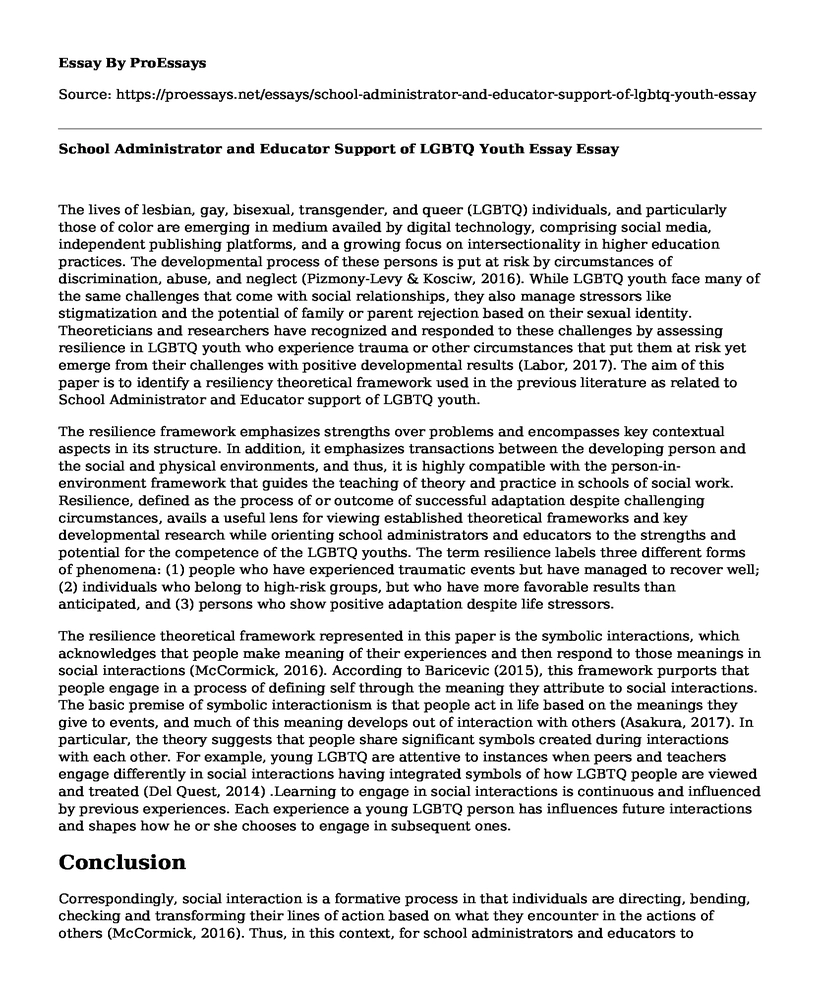The lives of lesbian, gay, bisexual, transgender, and queer (LGBTQ) individuals, and particularly those of color are emerging in medium availed by digital technology, comprising social media, independent publishing platforms, and a growing focus on intersectionality in higher education practices. The developmental process of these persons is put at risk by circumstances of discrimination, abuse, and neglect (Pizmony-Levy & Kosciw, 2016). While LGBTQ youth face many of the same challenges that come with social relationships, they also manage stressors like stigmatization and the potential of family or parent rejection based on their sexual identity. Theoreticians and researchers have recognized and responded to these challenges by assessing resilience in LGBTQ youth who experience trauma or other circumstances that put them at risk yet emerge from their challenges with positive developmental results (Labor, 2017). The aim of this paper is to identify a resiliency theoretical framework used in the previous literature as related to School Administrator and Educator support of LGBTQ youth.
The resilience framework emphasizes strengths over problems and encompasses key contextual aspects in its structure. In addition, it emphasizes transactions between the developing person and the social and physical environments, and thus, it is highly compatible with the person-in-environment framework that guides the teaching of theory and practice in schools of social work. Resilience, defined as the process of or outcome of successful adaptation despite challenging circumstances, avails a useful lens for viewing established theoretical frameworks and key developmental research while orienting school administrators and educators to the strengths and potential for the competence of the LGBTQ youths. The term resilience labels three different forms of phenomena: (1) people who have experienced traumatic events but have managed to recover well; (2) individuals who belong to high-risk groups, but who have more favorable results than anticipated, and (3) persons who show positive adaptation despite life stressors.
The resilience theoretical framework represented in this paper is the symbolic interactions, which acknowledges that people make meaning of their experiences and then respond to those meanings in social interactions (McCormick, 2016). According to Baricevic (2015), this framework purports that people engage in a process of defining self through the meaning they attribute to social interactions. The basic premise of symbolic interactionism is that people act in life based on the meanings they give to events, and much of this meaning develops out of interaction with others (Asakura, 2017). In particular, the theory suggests that people share significant symbols created during interactions with each other. For example, young LGBTQ are attentive to instances when peers and teachers engage differently in social interactions having integrated symbols of how LGBTQ people are viewed and treated (Del Quest, 2014) .Learning to engage in social interactions is continuous and influenced by previous experiences. Each experience a young LGBTQ person has influences future interactions and shapes how he or she chooses to engage in subsequent ones.
Conclusion
Correspondingly, social interaction is a formative process in that individuals are directing, bending, checking and transforming their lines of action based on what they encounter in the actions of others (McCormick, 2016). Thus, in this context, for school administrators and educators to understand the choices and behaviors of LGBTQ youths, they must understand the meanings the latter gives to those behaviors and the contexts in which those behaviors make sense for them (Marx, Roberts, & Nixon, 2017). School administrators and educators need to see through the LGBTQ youths' eyes to understand why they behave as they do. In essence, Madsen and Green (2012) assert that this framework allows school administrators and educators to look at how LGBTQ youths act in response to their experiences to discover the meanings they place on those experiences and actions.
References
Asakura, K. (2017). Paving Pathways through the Pain: A Grounded Theory of Resilience among Lesbian, Gay, Bisexual, Trans, and Queer Youth. Journal of Research on Adolescence, 27(3), 521-536.
Baricevic, M. (2015). Sexual Orientation Microaggressions in High Schools. University of Missouri-Saint Louis.
Del Quest, A. (2014). Out of the Way and Out of Place: An Interpretative Phenomenological Analysis of the Experiences of Social Interactions of Bisexually Attracted Young People (Doctoral dissertation, Portland State University).
Labor, S. L. (2017). LGBTQ Mid-Level Administrators of Color in Student Affairs: Experiences of Support and Resilience.
Madsen, P. W., & Green, R. J. (2012). Gay adolescent males' effective coping with discrimination: A qualitative study. Journal of LGBT Issues in Counseling, 6(2), 139-155.
Marx, R. A., Roberts, L. M., & Nixon, C. T. (2017). When care and concern are not enough: School personnel's development as allies for trans and gender non-conforming students. Social Sciences, 6(1), 11.
McCormick, M. (2016). Bullying Experiences and Resilience in LGBTQ Youth.
Pizmony-Levy, O., & Kosciw, J. G. (2016). School climate and the experience of LGBT students: A comparison of the United States and Israel. Journal of LGBT youth, 13(1-2), 46-66.
Cite this page
School Administrator and Educator Support of LGBTQ Youth Essay. (2022, Jun 22). Retrieved from https://proessays.net/essays/school-administrator-and-educator-support-of-lgbtq-youth-essay
If you are the original author of this essay and no longer wish to have it published on the ProEssays website, please click below to request its removal:
- Survey Education: Journal Reflection
- School Administrator and Educator Support of LGBTQ Youth Essay
- Essay on Exploring Factors Impacting Student Learning: Social, Emotional, Economic, and Religious
- Essay Exampel on Tech Revolution: Enhancing Learning for Young Children
- Paper Sample on Teachers: Strategies to Help Students Achieve Top Grades
- A Strategic Leadership Plan: A Personal Vision, Mission, and SMART Goals - Essay Sample
- Article Review - Linguistic Determinism in Science and Everyday Communication: Exploring Whorf's Perspective







